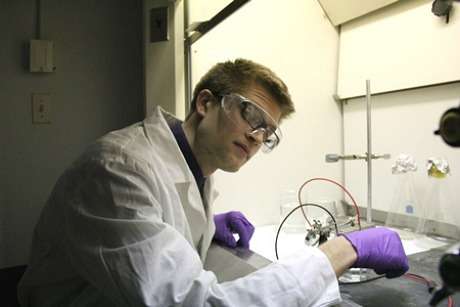Research project aimed at improving cancer treatment

An undergraduate engineering student at the University of Alberta is taking part in leading-edge medical research that could have a profound effect on the type of treatment some cancer patients receive.
Under the supervision of renowned biomedical engineer Robert Burrell, Matthew Nickel is working on a new device that could give surgeons important information about the type of cancer a patient has, and help them decide what type of surgery to perform.
At present, thyroid cancer patients undergoing surgery are treated as though the cancer has spread when in 40 per cent of cases, it hasn't. That means some patients undergo a surgical procedure that's more aggressive than need be, and it means they receive a more potent chemotherapy treatment after the surgery.
But the device Nickel and Burrell are working on would tell surgeons in the operating room whether or not the cancer has spread, allowing the surgeon to tailor the operation to match the patient's needs.
"Right now, this test takes three days," said Burrell, who holds the Canada Research Chair in Nanostructured Biomaterials and is the chair of the U of A's Department of Biomedical Engineering.
Using the device, Burrell adds, "We could get the information to surgeons in minutes and change the amount of surgery and type of post-operative care for 40 per cent of their patients."
"It will significantly help the 40 per cent of patients who currently get the same treatment, which is for the worst-case scenario," said Nickel.
The diagnostic tool the two are working on will act like a litmus test. Surgeons will smear cancerous tissue onto a glass chip. The cancer cells will react with antigens on the surface of the glass and change colour. The colour tells the surgeon which type of cancer the patient has, and the surgeon proceeds based on the outcome of the test.
Nickel's role is to anodize and conduct materials characterization tests on the chips using X-ray diffraction and a scanning electron microscope. He's performing the work under the Dean's Research Award program in the Faculty of Engineering, which gets undergraduate students involved with leading-edge research.
Nickel says the experience reinforces what he's learning in the classroom because he's applying it in real-life situations.
"I'm finding that it really makes me go back and review my materials and notes to make sure I understand how to characterize materials," he said. "When you get to review information and then apply it, that makes it solid."
Nickel is in his third year of materials engineering studies, with a biomedical engineering specialization. He's also the recipient of the Trudy Sorensen Memorial Scholarship in Biomedical Engineering. The $5,000 scholarship is awarded annually to a student with superior academic achievement entering the second, third or fourth year of study in the biomedical option of materials engineering.
The scholarship was established by Jim Sorensen, '63 BSc(ChemEng), and his wife Marlene, '70 MEd, in memory of their daughter Trudy, who lost her life to cancer.
"Receiving this scholarship is interesting because the work I'm doing with Dr. Burrell is related to cancer," said Nickel. "It allows me to pay it forward by doing research into cancer diagnostics."


















